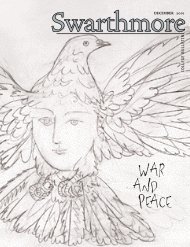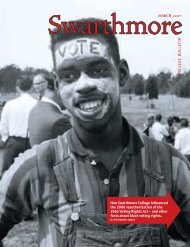TRUTH
Swarthmore College Bulletin (December 2006) - ITS
Swarthmore College Bulletin (December 2006) - ITS
- No tags were found...
Create successful ePaper yourself
Turn your PDF publications into a flip-book with our unique Google optimized e-Paper software.
enough, to push them back. When we finishedthe exercise, our platoon commanderchewed us out. “You just offended an entireneighborhood! You just made yourself newenemies!”It was eye-opening to see how jumpy wewere, even in training, and how quickly webecame aggressive, even when that was notour intent. It was also eye-opening to seehow vulnerable we were. If we bent a littletoo far the other way and let down ourguard, even for a moment, the role playerswho played the insurgents were able to hitus with brutal efficiency, shooting us withpaint balls from inside buildings or emergingfrom a crowd to reveal that they had gottenwithin striking distance of us whilewearing a suicide vest.When training gave way to real combatpatrols, this conundrum only deepened. Themain thing I learned in my time in Iraq wasthat, even if the insurgency were not as largeas it is, it would have created enormousproblems for the U.S. military mission inIraq. Iraqi civilians risk being fired on if theydrive too close to an American convoy or failto obey commands at a checkpoint. Men infull combat gear patrol through their neighborhoods,looking at them with wary suspicion.These are intolerable circumstancesfor civilians to live under, but it is clear toanyone who serves there why these thingshappen.Death first struck our company when acivilian pulled his car up beside one of ourconvoys and blew himself up. The last memberof our company to die lost his life 2weeks before he was scheduled to comehome. It happened when a man and awoman blew themselves up inside their carat a checkpoint. When we were on patrol, wewanted to be friendly and to engage Iraqisin conversation. We wanted the face ofAmerica to be a smile, not a scowl. But thisis not easy when—as I found out personally—youare liable at any time to be shot by asniper lurking somewhere in the complicated,chaotic 360-degree urban combat environmentsurrounding you.On May 12, a snipergot me in his sightsand took his shot.I heard a loud buzzingin my head. It wasas if my body wasscreaming:“Something’s wrong!Something’s wrong!”After we completed our training, we flew toKuwait, where we spent about a week acclimatizingto the heat. Then we rode a C-130into an Air Force base in al Anbar Province.We descended in a kind of spiraling divebecause incoming planes are vulnerable torocket fire. As we made our descent, ourELEFTHERIOS KOSTANSstomachs jumped into our throats.When a convoy arrived at the base topick us up, we got our first experience of thereal Iraq. We got our ammunition andloaded up. Our plan was to travel throughFallujah by day, but the transport unitrefused. “We don’t go through Fallujah duringthe day,” they told us. “It’s foolish. We’dbe IEDed [attacked by an improvised explosivedevice] if we did.” So we went at night.That first experience was the most tenseI remember being. I was on a 7-ton truck,facing outward. We were in full combat gear,armed and ready if something were to happen.We would end up patrolling throughFallujah every day over the coming months,in vehicles and on foot. The fear eventuallywore off, because—for better or worse—it isphysically impossible to be tense all the timefor weeks on end. During that first tripthrough Fallujah, though, I remember justsitting there, waiting for a bomb to go off.We drove right through the center of thecity. Bombed-out buildings and rubble wereeverywhere. It was very sobering, very sad.My first reaction that night was of thetragedy of it all. Later, what impressed memost, during every patrol, was to see peopleout on their rooftops, repairing and rebuilding.Since the city had earlier been evacuated,I asked myself: “Why are these peoplehere? Why would people come back to livehere?” But it was their home. Despite thewar, the presence of insurgents, and thedanger to civilians, people were still perseveringand seeking to build a life for themselvesamidst the chaos. That never failed tomove me.The ability of people to adjust to suchcircumstances is extraordinary. When firefightsbroke out, civilians would scatter,then warily look around to gauge what wasgoing on. If it looked like it was going to bea prolonged fight, people would shutter uptheir buildings and go home. Otherwise,they just went back to business as usual.Seeing this up close made it all the moreapparent how oddly disconnected people inthe United States are from what is going ondecember 2006 : 27
















